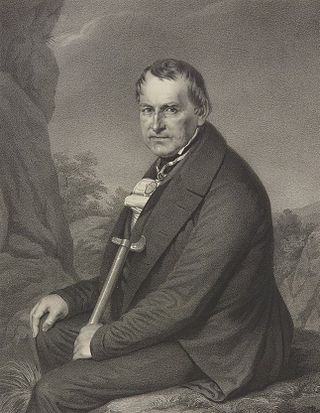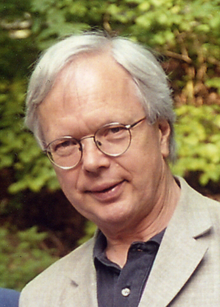
Friedrich Wilhelm Christian Karl Ferdinand von Humboldt was a German philosopher, linguist, government functionary, diplomat, and founder of the Humboldt University of Berlin, which was named after him in 1949.

Friedrich Wilhelm Heinrich Alexander von Humboldt was a German polymath, geographer, naturalist, explorer, and proponent of Romantic philosophy and science. He was the younger brother of the Prussian minister, philosopher, and linguist Wilhelm von Humboldt (1767–1835). Humboldt's quantitative work on botanical geography laid the foundation for the field of biogeography, while his advocacy of long-term systematic geophysical measurement pioneered modern geomagnetic and meteorological monitoring.

Integrated geography is where the branches of human geography and physical geography overlap to describes and explain the spatial aspects of interactions between human individuals or societies and their natural environment, these interactions being called coupled human–environment system.

Berthold Karl HölldoblerBVO is a German zoologist, sociobiologist and evolutionary biologist who studies evolution and social organization in ants. He is the author of several books, including The Ants, for which he and his co-author, E. O. Wilson, received the Pulitzer Prize for non-fiction writing in 1991.

Johann Friedrich Blumenbach was a German physician, naturalist, physiologist, and anthropologist. He is considered to be a main founder of zoology and anthropology as comparative, scientific disciplines. He has been called the "founder of racial classifications."

William Buckland DD, FRS was an English theologian who became Dean of Westminster. He was also a geologist and palaeontologist.

Christian Leopold von Buch, usually cited as Leopold von Buch, was a German geologist and paleontologist born in Stolpe an der Oder and is remembered as one of the most important contributors to geology in the first half of the nineteenth century. His scientific interest was devoted to a broad spectrum of geological topics: volcanism, petrology, fossils, stratigraphy and mountain formation. His most remembered accomplishment is the scientific definition of the Jurassic system.

The Bridgewater Treatises (1833–36) are a series of eight works that were written by leading scientific figures appointed by the President of the Royal Society in fulfilment of a bequest of £8000, made by Francis Henry Egerton, 8th Earl of Bridgewater, for work on "the Power, Wisdom, and Goodness of God, as manifested in the Creation." Despite being voluminous and costly, the series was very widely read and discussed, becoming one of the most important contributions to the Victorian literature on the relationship between religion and science. They made such an impact that Charles Darwin began On the Origin of Species with a quotation from the Bridgewater Treatise of William Whewell.

The Göttingen Academy of Sciences is the oldest continuously existing institution among the eight scientific academies in Germany, which are united under the umbrella of the Union of German Academies of Sciences and Humanities. It has the task of promoting research under its own auspices and in collaboration with academics in and outside Germany. It has its seat in the university town of Göttingen. Its meeting room is located in the auditorium of the University of Göttingen.
Metabiography is the literary study of the relation of biographies to the temporal, geographical, institutional, intellectual or ideological locations of their writers. It is a hermeneutics of biography that sees the biographical subject as a collective construct of different memory cultures, proposing an essential instability of historical lives. In the words of Steven Shapin, metabiography stresses “that shifting biographical traditions make one person have many lives,” none of these necessarily more real than any other, because all are “configured and reconfigured according to the sensibilities and needs of the changing cultural settings.” In this sense, metabiography expresses a belief in the observer-dependence of historical knowledge.
Jörg Rüpke is a German scholar of comparative religion and classical philology, recipient of the Gay-Lussac Humboldt Prize in 2008, and of the Advanced Grant of the European Research Council in 2011. In January 2012, Rüpke was appointed by German Federal President Christian Wulff to the German Council of Science and Humanities.
Ottmar Ette is Professor of Romance languages and Comparative literature at University of Potsdam.
The Gay-Lussac–Humboldt Prize is German–French science prize. It was created in 1981 by French President Valéry Giscard d'Estaing and German Chancellor Helmut Schmidt based on the recommendation of the German and French research ministries. The prize money is €60,000.

Sergius Nikolajewitsch von Bubnoff was a geologist and geotechnical engineer with Germano-Baltic ancestry who made important contributions to the rebuilding of geological research in East Germany after World War II. Starting in 1922, he was a professor at the University of Breslau. In 1929 he became a professor at the University of Greifswald and in 1950, he started his professorship at the Humboldt-University of Berlin. The Bubnoff unit, which is the unit of measure for the speed of geological processes, is named after him.
The Göttingen Faculty of Theology is the divinity school at the University of Göttingen, officially denominated the "United Theological Departments" but commonly referred to as the "Theological Faculty" . It was instituted at the foundation of the University, in 1737, along with the three other original faculties of Law, Medicine, and Philosophy. Over the centuries, the Göttingen Faculty of Theology has been home to many influential scholars and movements, including the rise of historical criticism, Ritschlianism, the History of Religions School, and Dialectical Theology. Its members were also involved in the Göttingen School of History.
Marina V. Rodnina is a German biochemist.
Ulrich Aloysius Konrad is a German musicologist and professor at the Institute for Music Research of the University of Würzburg. He is considered an expert on European music of the 17th to 20th centuries, especially the works of Mozart, Robert Schumann, Richard Wagner and Richard Strauss. He wrote a biography, Wolfgang Amadé Mozart, and studied the composer's sketches.
Regine Kahmann is a German microbiologist and was Director at the Max Planck Institute for Terrestrial Microbiology in Marburg from 2000 to 2019. She was made a Foreign Member of the Royal Society (ForMRS) in 2020.
Rudolf Vierhaus was a German historian who mainly researched the Early modern period. He had been a professor at the newly founded Ruhr University Bochum since 1964. From 1971, he was director of the Max-Planck-Institut für Geschichte in Göttingen. He became known for his research on the Age of Enlightenment.
Dirk Görlich, born October 18, 1966, in Halle (Saale) of Germany, is a German biochemist. He is now director at the Max Planck Institute for Multidisciplinary Sciences in Göttingen.










